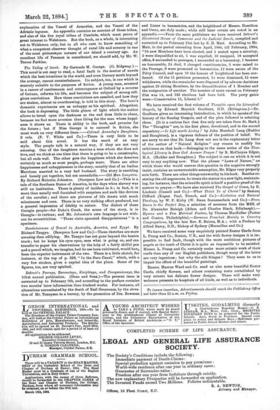The Valley of Sorek. By Gertrude M. George. (G. Ridgway.)—
This novel is not easy to read, a fatal fault in the matter of novels which the best intentions in the world, and even literary merit beyond the average, cannot counterbalance. Its subject, too, is one which is scarcely suitable to the purposes of fiction. A young man, arrested in a career of carelessness and extravagance at Oxford by a reverse of fortune, reforms his life, and becomes the subject of strong reli- gions convictions. How these convictions are assailed, and how they are shaken, almost to overthrowing, is told in this story. The hero's domestic experiences are as unhappy as his spiritual. Altogether, the book is depressing. The little gleam of light which the author allows to break upon the darkness at the end does little to cheer, because we feel more aversion than liking for the man whose happi- ness it shows us. There is ability in the book, and promise for the future ; but if Miss George is to succeed in fiction, she must work on very different lines.—Colonel Annesley'e Daughters. 3 vols. (F. V. White and Co.)—There is very little to be said about this novel. It has the merit of an easy style. The people talk in a natural way, if they are not very amusing. One of the daughters marries a man whom she does not love, and we think at one time that there is going to be a catastrophe, but all ends well. The other gets the happiness which she deserves certainly as much as most people, perhaps more. There are other ilappinesses and unhappinesses in the story, notably that of an Italian Marchese married to a very bad husband. The story is rambling and loosely put together, but not unreadable.—Old Man Langston. By Richard Malcolm Johnston. (Sampson Low and Co.)—This is a tale of the Southern States of America, in the days when slavery was still an institution. There is plenty of incident in it ; in fact, it is more than usually well furnished with surprises and such like devices of the novelist ; and there are pictures of life drawn with much minuteness and care. There is no very striking effect produced, but a general impression of fidelity to nature. The dialect of these Georgia people—for Duke's Creek, the scene of the story, is in Georgia—is curious; and Mr. Johnston's own language is not with- out its eccentricities. "These visits operated disappointment" is a specimen.


































 Previous page
Previous page